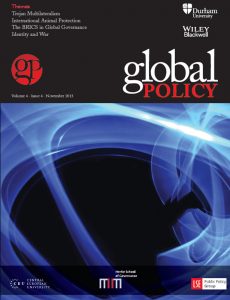Protesters Challenge Skeptics: The Earth is Round and Climate Change is Real
 The United Nations Climate Change Conference is taking place in Copenhagen from December 7th to 18th. Prior to the start of the conference, members of an action group, Stop Climate Chaos, organized demonstrations encouraging world leaders to advance a world climate change agreement. Around the world, people participated in these demonstrations including 40,000 people in London, 7,000 people in Glasgow, and many more in Belfast. Members of another action group, Camp for Climate Change, organized a 48-hour-long protest in Trafalgar Square in London. Protesters explained that they wanted to illuminate the influence of the “political and economic system” on climate change. At these protests, people declared several demands, one of which called for core nations to reduce carbon emissions by 80 percent by the year 2050.
The United Nations Climate Change Conference is taking place in Copenhagen from December 7th to 18th. Prior to the start of the conference, members of an action group, Stop Climate Chaos, organized demonstrations encouraging world leaders to advance a world climate change agreement. Around the world, people participated in these demonstrations including 40,000 people in London, 7,000 people in Glasgow, and many more in Belfast. Members of another action group, Camp for Climate Change, organized a 48-hour-long protest in Trafalgar Square in London. Protesters explained that they wanted to illuminate the influence of the “political and economic system” on climate change. At these protests, people declared several demands, one of which called for core nations to reduce carbon emissions by 80 percent by the year 2050.
Prime Minister Gordon Brown contended that the majority of people believed scientific evidence for human-made global warming. He hoped that world leaders at the conference would be able to convince skeptics: “There’s a flat earth group over the evidence, if I may say so, that exists about climate change, and we’ve got to show them that the scientific evidence is strong.” He also explained: “The public need to be angry about the extent to which we have not taken action sufficiently as a world until now, and they’ve got to then see that the first climate change agreement is not only necessary, it’s absolutely essential.”
Schofer and Hironaka (2005) determined that the institutionalization of the world environmental regime corresponds to lower levels of global environmental degradation. At the conference, world leaders may create a world climate change agreement. This world policy may influence national governments by passing down scripts. This increased penetration coupled with increased structure and persistence of environmental institutions has the potential to reduce environmental degradation and combat climate change.
Reference
Schofer, Evan and Ann Hironaka. 2005. “The Effects of World Society on Environmental Outcomes.” Social Forces 84:25-47.
“Emerging Trends in Environmental Sociology” By Frederick H. Buttel and August Gijswijt




1728-4457/asset/PopulationCouncilLogo.jpg?v=1&s=03074651676b98d6b9d0ef1234bd48fe7ff937c3)

Fabulous title and it is great to see the UNCCC mentioned here. What a powerful win for world society this might be if the negotiations favor the climate over the economic and political structures.
Keri